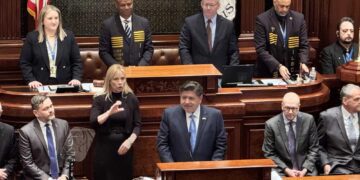Should states be able to tax outside their borders? The question of what taxing powers states have over internet commerce will arrive soon at the Supreme Court in the case South Dakota v. Wayfair. South Dakota (and many other states) want to be able to force out-of-state retailers to collect sales taxes and remit them back to the state. The state argues that internet commerce has made the Court’s physical presence rule—which says states can tax only companies that are physically present in the state—unworkable.
But, as Adam Michel and Elizabeth Slattery explain, abandoning the physical presence rule would undermine both the democratic accountability of our federal system and create an even greater inequality in the tax treatment of retail sales:
Proposals to overturn the physical presence standard in Quill and expand state taxing powers risk undermining foundational principles of competitive federalism while increasing compliance burdens on small businesses.
Permitting interstate tax collection would undermine local business owners’ ability to vote on tax laws that affect them. Without a physical presence standard, local Oregon e-retailers would suddenly have to comply with every sales tax law in over 10,000 state and local taxing jurisdictions. If states wish to impose costs on retailers within their borders, they should be able to do so. However, retailers should not be subject to mandates from states with which they have no physical connection—and whose policymakers face no accountability for the tax and regulatory costs they impose.
Interstate taxation would also introduce a new disparity. Local brick-and-mortar stores have only the compliance burden of their state and local tax systems. Expanded interstate taxes would subject remote sellers to tax systems in every state in which they have a customer. The compliance burdens for online retailers could be prohibitively expensive. Even with new technology solutions and simplified state sales taxes, the cost of new tax software, compliance and liability costs, claims by tax-exempt customers, inquiries from tax authorities, and time to address the inevitable glitches are overwhelming costs to small businesses.
The physical presence standard preserves the natural limits of state revenue collectors and protects out-of-state retailers from undue compliance burdens. Internet vendors should be taxed on an equal footing with brick-and-mortar retailers—at the “origin of sale.”Because legislators have enlisted businesses as their tax collectors, the tax collection is best tied to the business location.[Internal citations omitted.]
[Adam Michel and Elizabeth Slattery, “Do Borders Matter? The Supreme Court Review Internet Sales Taxes,” The Heritage Foundation, April 12]







